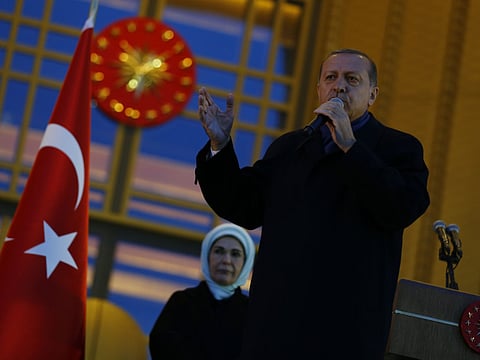This is the end of Turkey as we know it
Egged on by Erdogan, the country has voted for greater authoritarianism. It was the revenge of those on the periphery of Turkish society

With the result of Sunday’s referendum on its constitution, Turkey as we know it is over; it is history.
The architecture of its governance designed by Mustafa Kamal Ataturk — Turkey’s founder — has, after a wobbly series of experiments with the military and a secular elite in charge, seen itself dismantled by the leader of the Justice and Development party (AKP). The collapse of the rule of law that took place in slow motion after the Gezi Park protests has been followed by the erosion of the separation of powers and the annihilation of the independent media.
It’s hard not to notice the striking resemblance to the sequence of events in Germany from 1933: the Reichstag fire, the Night of the Long Knives, the infamous referendum in 1934. The similarities give one a powerful sense of history copy-and-pasting itself. No wonder those who once shrugged at such comparisons are now in shock — particularly when they heard the harsh rhetoric of President Recep Tayyip Erdogan’s victory speech: he pledged to an ecstatic crowd that one of his highest priorities is to reintroduce capital punishment.
This is one possible interpretation. Another is that Sunday’s result was the closing of a chapter in which the “periphery” of Turkish society — rural and mainly pious — took its revenge on the “centre” of the old republic. That is what some figures of the AKP have called “the silent revolution”.
Complicated history
“The Turkish republic has an undeniably complicated history,” wrote Steven Cook, from the Council on Foreign Relations, in an essay for Foreign Policy, entitled RIP Turkey; 1921-2017.
“It is an enormous achievement. In the space of almost a century, a largely agrarian society that had been devastated by war was transformed into a prosperous power that wielded influence in its own region and well beyond. At the same time, modern Turkey’s history has also been non-democratic, repressive and sometimes violent. It thus makes perfect political sense for Erdogan to seek the transformation of Turkey by empowering the presidency and thereby closing off the possibility once and for all that people like him will be victims of the republic.”
It has been painful for me to witness the immense disappointment of Turkish intellectuals, resilient by tradition, and mainly left-leaning. All I could hear by phone or on social media was tormented despair — a crushing sense of defeat. What united all those in academia and the media or in NGOs, regardless of their political stripes, was that they had hoped for democratic change under the AKP.
Many of them had given credit to the party, and its early pledges and steps towards an order where the sharing of power would break the vicious circle of the republic. They wanted to believe in human rights, freedom and an end to the decades-long Kurdish conflict. But the deliberate reversal of democratisation left all of them feeling they had been duped. This conclusion became undeniable when last summer’s attempted coup — the details of which are still unclear — led to an immense purge. Given this mood of despair and the sense of defeat, we should expect another exodus of fine human resources in the coming months and years.
Journalists — such as me, abroad, or at home — will find themselves challenged even more after the referendum. Coverage of corruption will be a daredevil act, severe measures against critical journalism will continue and the remaining resistance of media proprietors will vanish.
Illusion of dignified fourth estate
The Turkish media will begin to resemble those of the Central Asian republics, where only mouthpieces for those in power are allowed to exist. Inevitably, these conditions will shift the epicentre of independent journalism to outside the borders of Turkey. My colleagues have already realised that their dreams of a dignified fourth estate were nothing but an illusion.
“At the end of the day, Erdogan is simply replacing one form of authoritarianism with another,” wrote Cook.
“The Turkish republic has always been flawed, but it always contained the aspiration that — against the backdrop of the principles to which successive constitutions claimed fidelity — it could become a democracy. Erdogan’s new Turkey closes off that prospect.”
The old republic was already ailing, and it has just been dealt its final blow.
— Guardian News & Media Ltd
Yavuz Baydar is the co-founder of P24, the Platform for Independent Media, and is a columnist and blogger.



